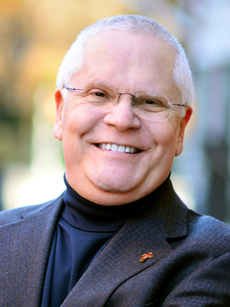‘Two Greatest Commandments’ are intertwined

Deacon Greg Kandra
Living the Word / Deacon Greg Kandra
Thirtieth Sunday in Ordinary Time, Oct. 29
Exodus 22:20-26; Psalms 18:2-3, 3-4, 47, 51; 1 Thessalonians 1:5c-10; Matthew 22:34-40
Anyone who has spent time watching reruns of “Law and Order” knows the first rule of being a good witness in a courtroom: Never answer a question that you haven’t been asked. Stay on point. Don’t elaborate. Keep it short and simple.
Clearly, Jesus never watched “Law and Order.”
In this Sunday’s Gospel, when the Pharisees confront him with what they think will be a confounding question — “Which commandment in the law is the greatest?” — Jesus answers them directly. “You shall love the Lord, your God, with all your heart, with all your soul, and with all your mind.”
But then he goes a step further. He answers a question he wasn’t asked. “The second is like it,” he explains. “You shall love your neighbor as yourself.”
What we glean from this encounter is commonly understood as “The Two Greatest Commandments,” and they form the very foundation of Judeo-Christian thought. “The whole law and the prophets depend on these two commandments,” Jesus tells the Pharisees.
“WHO IS MY NEIGHBOR?”
But that’s just the beginning. Binding these two commandments together, Jesus makes clear the profoundly important point that you can’t have one without the other. He is showing the Pharisees (and us) that if you think you can simply worship God and ignore your neighbor, think again. We cannot neglect those around us in need. In fact, we should not just care for them; we need to love them.
More than that, we should love them as much as we love ourselves.
In Luke’s account of this episode, the Pharisees are so taken aback by Jesus’s talk of loving your neighbor, it leads one of them to ask, “Who is my neighbor?”
The answer, of course, unfolds as one of Christ’s greatest parables, The Good Samaritan, serving to emphasize (if anyone was missing the point) that we are responsible for one another, even those who are different from us and may not believe what we believe. Their culture may be alien to us. But that makes no difference. They are still — in a very human sense — our neighbors.
LOVING THOSE “NOT LIKE US”
All of this helps give immediacy to this Sunday’s first reading, from Exodus, which cries out to us in our own day and age: “You shall not molest or oppress an alien . . . you shall not wrong any widow or orphan.”
This undoubtedly struck a nerve thousands of years ago — and it should hit us just as hard today. At a time when there is so much debate about what to do about migrants coming to our shores, these readings stand as defiant, challenging, even countercultural. They propose a radical way of thinking about those who are “alien,” commanding us to treat them with love.
But these readings might also offer us a radical way of considering who is really “alien” to us. Being an “alien” is about more than geography, nationality or whatever country is stamped on your passport.
Aliens are any of those who we might consider “different.” It might be because of their skin color, their language, their heritage or how they dress. It might be because of how they worship or, maybe, even how they vote. At bottom, any group of people that is considered “not like us” could be considered “alien” or even, to some people, strange.
The Gospel makes clear: those differences don’t matter. Love them as you love yourself.
Jesus dared to answer a question nobody asked. We need to be courageous enough, and humble enough, to ask ourselves questions we might not want to answer. Questions like: Who are the ones we consider alien? Who are the “neighbors” we ignore or shun or go out of our way to avoid?
Are we capable of loving these people as much as we love ourselves? Finding the answers to those questions can draw us closer to living as Jesus lived and loving as he loved.
Which can only help us fulfill that first commandment — and lead us to loving the Lord, our God, more completely.
DEACON GREG KANDRA is an award-winning author and journalist, and creator of the blog, “The Deacon’s Bench.”





